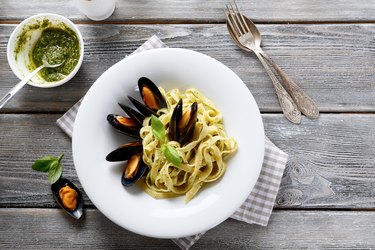
The ancient Romans cultivated molluscs for jewelry and food thousands of years ago. This family of sea animals includes oysters, scallops and clams. Another member, the mussel, remains a popular delicacy. Eating mussels has some nutritional benefits. You should, however, avoid eating them raw to avoid food-borne illness.
Tip
Mussels are low in fat and high in protein, and when consumed cooked, make a healthy addition to your diet.
Video of the Day
Eating Mussels Gives You Macronutrients
Prehistoric people from South Africa relied on molluscs to get enough protein. Modern scientists have closely analyzed the macronutrients in mussels. Mussels mostly contain protein. They have only a small amount of carbohydrate and fat. Therefore, mussels have an excellent nutritional profile for helping with weight loss, according to a 2014 report by Dadun at the University of Navarra, because protein has more satiating power than fat or carbohydrates.
Video of the Day
Eating Mussels Gives You Micronutrients
The U.S. government considers a food a good source of a vitamin when it gives you 10 percent of the recommended daily value in a single serving. Given this definition, mussels have significant amounts of vitamin B-12, phosphorus and iron. They also contain essential omega-3 fatty acids like eicosapentaenoic acid (EPA) and docosahexaenoic acid (DHA). These fats have many health benefits, including supporting hearth and brain health.
Eating Mussels May Cause Toxicity
Scientists estimate that two-thirds of all species have disappeared since life started on earth. Some of this loss comes from human pollution. Such contamination does more than just kill species — it also makes them toxic to eat. You may absorb some of their toxicity.
The soft tissue of mussels makes them especially vulnerable to pollution, according to an August 2018 report in the Marine Pollution Bulletin. This study found that 60 percent of mussels have pollution-related birth defects. The impact of eating mutated seafood remains unknown, but plastic-contaminated seafood may pose a threat to the entire food chain.
Eating Mussels May Cause Paralysis
Not all mussel toxins come from human activity. Some of them naturally happen. Mussels survive by eating different plankton species. Members of the Dinophysis family of plankton contain a poison that causes respiratory paralysis in humans. Scientists call this deadly effect paralytic shellfish poisoning. More cases of such poisoning occur each year, according to a July 2018 paper in the Journal of Veterinary Research. Cooking mussels increases the poison content. Thus, monitoring programs provide the only way to avoid this toxin.
Eating Mussels Can Cause Sickness
Other mussel toxins have a less severe effect. A 2016 paper by the Scientific Committee of the Food Safety Authority of Ireland described amnesic shellfish poisoning. The Pseudo-nitzschia plankton that the mussels dine on cause this poisoning, which can cause brain damage. Like paralytic shellfish poisoning, cooking doesn't prevent amnesic shellfish poisoning. Boiling, however, greatly lowers your risk. Thus, you should boil mussels to avoid this poison and many other toxins.
Eating Mussels May Cause Allergic Reactions
Many people have allergic reactions to seafood,including mussels. These reactions run from mild to severe. This is a genetic trait that will likely affect you for your entire life, according to a 2016 review in the Journal of the American College of Nutrition. The authors of this review noted an increase in the number of seafood reactions during the past 20 years. The reasons for this increase remain unknown, but doctors can test you for susceptibility.
- Middle East Journal of Science: Molluscs: Their Usage as Nutrition, Medicine, Aphrodisiac, Cosmetic, Jewelry, Cowry, Pearl, Accessory and so on From the History to Today
- LIVESTRONG.COM: Mussels Nutrition Information
- Ukrainian Food Journal: Microbiological Investigation of Wild, Cultivated Mussels (Mytilus galloprovincialis L. 1819) and Stuffed Mussels in Sinop–Turkey
- Quaternary International: Intertidal Shellfish as a Source of Protein and Energy for the Middle Stone Age Inhabitants of the Southwestern Cape and Northern KwaZulu-Natal, South Africa
- Food Chemistry: Seasonal and Geographical Variations in the Biochemical Composition of the Blue Mussel (Mytilus edulis L.) From Ireland
- HEALTHFULLY.COM: What Are the Benefits of Green-Lipped Mussels?
- Dadun: Personalized Weight Loss Strategies – The Role of Macronutrient Distribution
- Journal of Nutrition: Implications of US Nutrition Facts Label Changes on Micronutrient Density of Fortified Foods and Supplements
- ShellfisProcessing and Impact on Active Components in Food: Shellfish (Mussel) Processing and Components
- LIVESTRONG.COM: 17 Reasons Why You Probably Need More Omega-3s in Your Diet
- Pharma Journal: Consequences of Pollution in Wildlife
- Marine Pollution Bulletin: Heavy Metal Pollution and Its Relation to the Malformation of Green Mussels Cultured in Muara Kamal Waters, Jakarta Bay, Indonesia
- Scientific Reports: Anthropogenic Debris in Seafood
- Journal of Veterinary Research: Detection of Dinophysis Species and Associated Okadaic Acid in Farmed Shellfish
- Marine Drugs: Dinophysis Toxins
- Scientific Committee of the Food Safety Authority of Ireland: Occurrence of Marine Biotoxins and Risk of Exposure to Seafood Consumers in Ireland
- LIVESTRONG.COM: Seafood and Headaches
- Journal of Food Quality: Survey of Pathogens Isolated from Mussels Perna Perna Collected in Rocky Shore and Fishmarket of Niterói, RJ, and Their Respective Resistance Profile to Antimicrobial Drugs
- LIVESTRONG.COM: Seafood Allergies & Joint Pain
- Journal of the American College of Nutrition: Seafood Allergy, Toxicity, and Intolerance